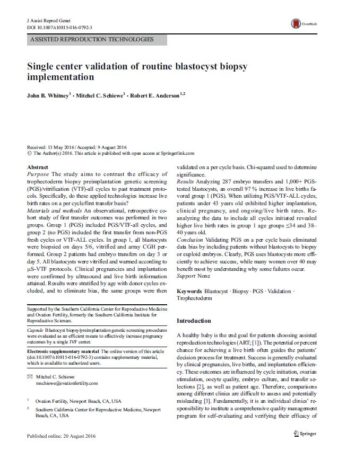 Women in their 30s and 40s who are trying to become pregnant using in vitro fertilization (IVF) benefit greatly from preimplantation genetic screening (PGS), according to a new study by the Southern California Center for Reproductive Medicine, in conjunction with Ovation Fertility™. By incorporating PGS into the IVF process, the study concluded that women of advanced maternal age experienced higher live birth rates per egg retrieval and fewer pregnancy losses.
Women in their 30s and 40s who are trying to become pregnant using in vitro fertilization (IVF) benefit greatly from preimplantation genetic screening (PGS), according to a new study by the Southern California Center for Reproductive Medicine, in conjunction with Ovation Fertility™. By incorporating PGS into the IVF process, the study concluded that women of advanced maternal age experienced higher live birth rates per egg retrieval and fewer pregnancy losses.
The study, newly published in the Journal of Assisted Reproduction and Genetics, was conducted by Robert E. Anderson, M.D., of Southern California Center for Reproductive Medicine, along with lead researchers John B. Whitney, B.S., and Mitchel C. Schiewe, Ph.D., both of Ovation Fertility.
Without using PGS, a woman undergoing IVF might have one or two embryos transferred each month, only to suffer the experience of having either a negative outcome or a spontaneous miscarriage of a chromosomally abnormal embryo. However, by incorporating PGS to identify a single, genetically normal embryo to transfer, women have a statistically higher chance of achieving a successful pregnancy, according to the study.
Rather than base pregnancy results solely on the success rate of each embryo transfer, the study evaluated the impact of PGS on an entire IVF cycle. This methodology gave a more accurate prediction of a woman’s likelihood to become pregnant when starting an IVF cycle and emphasized the benefit of PGS.
Read the full study here